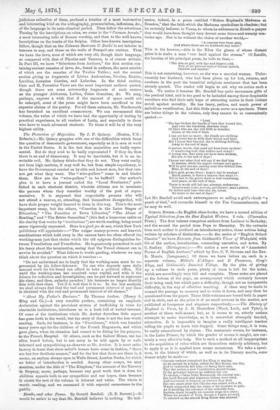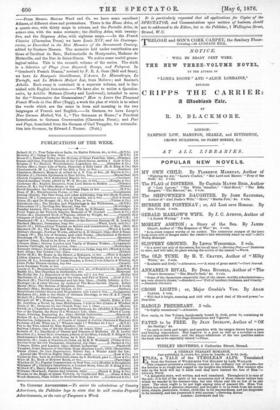ScuooL Boors.—In English class-books, we have a second edition of
Typical Selections from the Best English Writers. 2 vols. (Clarendon Press.) The first volume comprises authors from Latimer to Berkeley, and the second the period from Pope to Macaulay. To the extracts from each author is prefixed an introductory notice, these notices being written by scholars of distinction.—In the series of "English School Classics" we have Extracts from Goldsmith's Vicar of Wakefield, with life of the author, introduction, connecting narrative, and notes. By
C. Sankey. (Rivingtons.)—We notice a new series of "Annotated Poems of English Authors," edited by Rev. C. T. Stevens and the ROT.
D. Morris. (Longmans.) Of these wo have before us, each in a separate volume, Milton's L' Allegro and .11 Penseroso, Gray's Elegy, and Goldsmith's Deserted Village. By the plan of giving up a volume to each poem, plenty of room is left for the notes, which are accordingly very full and complete. These notes are placed at the bottom of the page, an arrangement which certainly favours their being read, but which puts a difficulty, though not an insuperable difficulty, in the way of effective teaching. A class may be made to commit the passage to memory and to write it down, and may then be questioned from the paper. Those little volumes are bound both in paper and in cloth, and as the price is of no small account in the matter, are published at fourpence and sixpence respectively.—The History of England in Verse, by J. G. Monteflore (Ward, Lock, and Tyler), is another of those well-meant, but, as it seems to us, utterly useless attempts to make knowledge, as it is somewhat strangely fancied, attractive. It is impossible to imagine a really intelligent teacher telling his pupils to learn this doggrel. Some things may, it is true, be easily remembered by rhyme. The mnemonic verses, for instance, in the Latin Primer, by which the gender of nouns is taught, are cer- tainly a very effective help. Nor is such a method at all inappropriate to the acquisition of rules which are themselves entirely arbitrary, but to apply it as it is applied here BOOMS monstrous. We take a speeis men, to the history of which, as well as to its literary merits, some demur might be made:- . Certain traitors conspired the King to waylay, As he passed by a farm, called the Rye House, one day, And to ruthlessly kill him,—it being their aim, That the nation a new Constitution should frame. Of the principal traitors he suffered but ono To escape,—"twas Duke Monmouth, his natural son; But Lord Russell and Algernon Sidney were tried, And convicted of treason, as traitors they died. But two years after this Charles was seized with a fit, Which compelled him the scene of his troubles to quit; As if mocking the schemes of his cowardly foes, Sudden death brought his notable reign to a close ; When his brother of York, though a Papist avowed. To succeed as the second King Tames was allowed." —From Messrs. Marcus Ward and Co. we have some excellent Atlases, of different sizes and pretensions. There is the Home Atlas, of a quarto size, with thirty maps in colours, and the Portable Atlas, in octavo size, with the same contents ; the Shilling Atlas, with twenty- dye, and the Sixpenny Atlas, with eighteen maps.—In the French Classics (Clarendon Press) we have Louis X1 V. and his Contempo- raries, as Described in the Best Memoirs of the Seventeenth Century, edited by Gustave Masson. The memoirs laid under contribution are those of Cardinal de Retz, Mademoiselle de Montpensier, Madame de Motteville, and the Due de Saint-Simon. We notice some useful genea- logical tables. This is the seventh volume of the series. The sixth is a Selection of Plays from Regnard, Brueys, and Palaprat. In " Gombert's French Drama," revised by F. E. A. Gasc (Bell and Sons), we have Le Bourgeois Gentilhomme, L'Avare, Le Misanthrope, Le Tartuffe, and Le Medecin Malyre Lui, from Moliere ; and Racine's Athalie. Each essay is contained in a separate volume, and is fur- nished with English foot-notes.—We have also to notice a Question- naire, by Achille Mottean (Crosby and Lockwood), intended to serve for the " Grammaire des Grammaires;" How to Learn One Thousand French Words in One Hour (Tegg), a work the plan of which is to select the words which are the same in form and meaning in the two languages of French and English.—In German, we have Lange's New German Method, Vol. I., "The Germane at Home ;" a Practical Introduction to German Conversation (Clarendon Press); and Poet and Page, translated from the German of Carl Toeppfer, for retransla- tion into German, by Edward J. Turner. (Nutt.)



































 Previous page
Previous page